Entrepreneurial Ventures, Skills, and UK Economic Impact Report
VerifiedAdded on 2020/06/05
|18
|4549
|65
Report
AI Summary
This report provides a comprehensive overview of entrepreneurship in the UK, examining the role of small enterprises, particularly in the context of Brexit. It delves into different types of entrepreneurial ventures, highlighting their similarities and differences, and assesses their impact on the UK economy. The report also explores the characteristics, traits, and skills essential for entrepreneurs, contrasting them with those of business managers. Furthermore, it analyzes the contributions of SMEs to social and economic growth, especially in the post-Brexit landscape. Key entrepreneurs like Mark Zuckerberg and Richard Branson are used as examples of success. The report emphasizes the importance of entrepreneurship for economic development, job creation, and the ability of small businesses to adapt to changing market conditions. The report highlights the flexibility and innovation that small scale businesses bring to the economy. The report concludes by underscoring the significant role of entrepreneurs in driving economic growth and overcoming challenges in the UK.

Entrepreneurship
Paraphrase This Document
Need a fresh take? Get an instant paraphrase of this document with our AI Paraphraser


⊘ This is a preview!⊘
Do you want full access?
Subscribe today to unlock all pages.

Trusted by 1+ million students worldwide
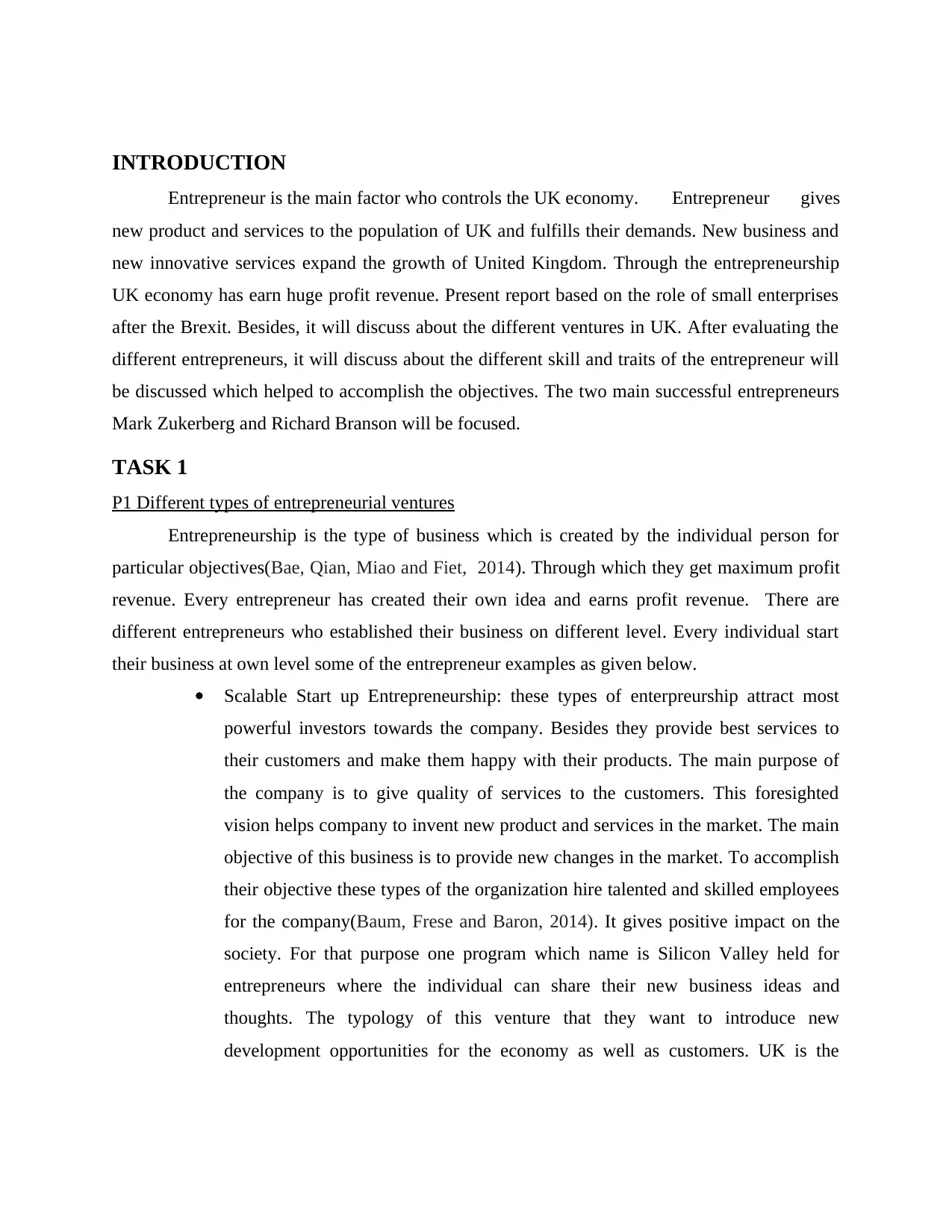
INTRODUCTION
Entrepreneur is the main factor who controls the UK economy. Entrepreneur gives
new product and services to the population of UK and fulfills their demands. New business and
new innovative services expand the growth of United Kingdom. Through the entrepreneurship
UK economy has earn huge profit revenue. Present report based on the role of small enterprises
after the Brexit. Besides, it will discuss about the different ventures in UK. After evaluating the
different entrepreneurs, it will discuss about the different skill and traits of the entrepreneur will
be discussed which helped to accomplish the objectives. The two main successful entrepreneurs
Mark Zukerberg and Richard Branson will be focused.
TASK 1
P1 Different types of entrepreneurial ventures
Entrepreneurship is the type of business which is created by the individual person for
particular objectives(Bae, Qian, Miao and Fiet, 2014). Through which they get maximum profit
revenue. Every entrepreneur has created their own idea and earns profit revenue. There are
different entrepreneurs who established their business on different level. Every individual start
their business at own level some of the entrepreneur examples as given below.
Scalable Start up Entrepreneurship: these types of enterpreurship attract most
powerful investors towards the company. Besides they provide best services to
their customers and make them happy with their products. The main purpose of
the company is to give quality of services to the customers. This foresighted
vision helps company to invent new product and services in the market. The main
objective of this business is to provide new changes in the market. To accomplish
their objective these types of the organization hire talented and skilled employees
for the company(Baum, Frese and Baron, 2014). It gives positive impact on the
society. For that purpose one program which name is Silicon Valley held for
entrepreneurs where the individual can share their new business ideas and
thoughts. The typology of this venture that they want to introduce new
development opportunities for the economy as well as customers. UK is the
Entrepreneur is the main factor who controls the UK economy. Entrepreneur gives
new product and services to the population of UK and fulfills their demands. New business and
new innovative services expand the growth of United Kingdom. Through the entrepreneurship
UK economy has earn huge profit revenue. Present report based on the role of small enterprises
after the Brexit. Besides, it will discuss about the different ventures in UK. After evaluating the
different entrepreneurs, it will discuss about the different skill and traits of the entrepreneur will
be discussed which helped to accomplish the objectives. The two main successful entrepreneurs
Mark Zukerberg and Richard Branson will be focused.
TASK 1
P1 Different types of entrepreneurial ventures
Entrepreneurship is the type of business which is created by the individual person for
particular objectives(Bae, Qian, Miao and Fiet, 2014). Through which they get maximum profit
revenue. Every entrepreneur has created their own idea and earns profit revenue. There are
different entrepreneurs who established their business on different level. Every individual start
their business at own level some of the entrepreneur examples as given below.
Scalable Start up Entrepreneurship: these types of enterpreurship attract most
powerful investors towards the company. Besides they provide best services to
their customers and make them happy with their products. The main purpose of
the company is to give quality of services to the customers. This foresighted
vision helps company to invent new product and services in the market. The main
objective of this business is to provide new changes in the market. To accomplish
their objective these types of the organization hire talented and skilled employees
for the company(Baum, Frese and Baron, 2014). It gives positive impact on the
society. For that purpose one program which name is Silicon Valley held for
entrepreneurs where the individual can share their new business ideas and
thoughts. The typology of this venture that they want to introduce new
development opportunities for the economy as well as customers. UK is the
Paraphrase This Document
Need a fresh take? Get an instant paraphrase of this document with our AI Paraphraser
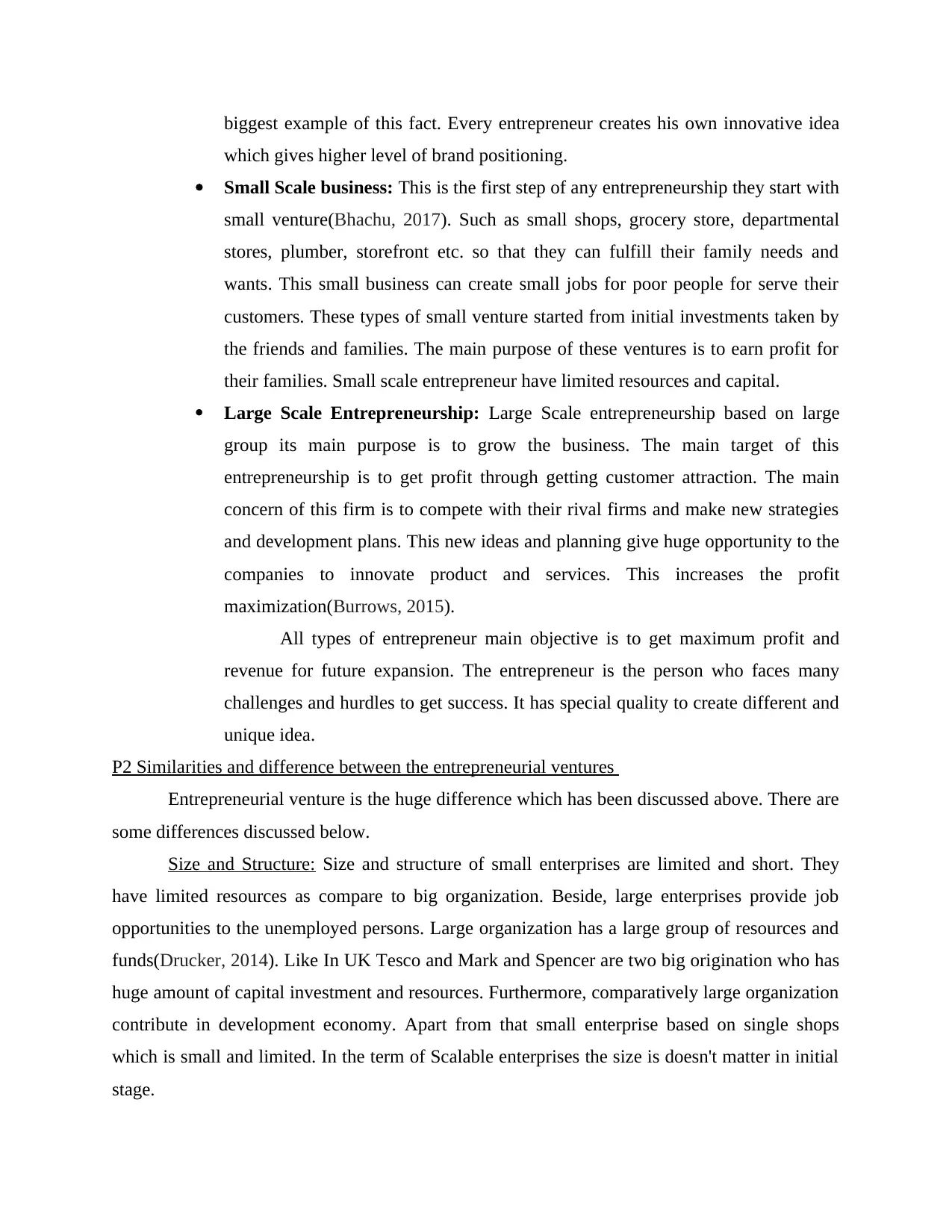
biggest example of this fact. Every entrepreneur creates his own innovative idea
which gives higher level of brand positioning.
Small Scale business: This is the first step of any entrepreneurship they start with
small venture(Bhachu, 2017). Such as small shops, grocery store, departmental
stores, plumber, storefront etc. so that they can fulfill their family needs and
wants. This small business can create small jobs for poor people for serve their
customers. These types of small venture started from initial investments taken by
the friends and families. The main purpose of these ventures is to earn profit for
their families. Small scale entrepreneur have limited resources and capital.
Large Scale Entrepreneurship: Large Scale entrepreneurship based on large
group its main purpose is to grow the business. The main target of this
entrepreneurship is to get profit through getting customer attraction. The main
concern of this firm is to compete with their rival firms and make new strategies
and development plans. This new ideas and planning give huge opportunity to the
companies to innovate product and services. This increases the profit
maximization(Burrows, 2015).
All types of entrepreneur main objective is to get maximum profit and
revenue for future expansion. The entrepreneur is the person who faces many
challenges and hurdles to get success. It has special quality to create different and
unique idea.
P2 Similarities and difference between the entrepreneurial ventures
Entrepreneurial venture is the huge difference which has been discussed above. There are
some differences discussed below.
Size and Structure: Size and structure of small enterprises are limited and short. They
have limited resources as compare to big organization. Beside, large enterprises provide job
opportunities to the unemployed persons. Large organization has a large group of resources and
funds(Drucker, 2014). Like In UK Tesco and Mark and Spencer are two big origination who has
huge amount of capital investment and resources. Furthermore, comparatively large organization
contribute in development economy. Apart from that small enterprise based on single shops
which is small and limited. In the term of Scalable enterprises the size is doesn't matter in initial
stage.
which gives higher level of brand positioning.
Small Scale business: This is the first step of any entrepreneurship they start with
small venture(Bhachu, 2017). Such as small shops, grocery store, departmental
stores, plumber, storefront etc. so that they can fulfill their family needs and
wants. This small business can create small jobs for poor people for serve their
customers. These types of small venture started from initial investments taken by
the friends and families. The main purpose of these ventures is to earn profit for
their families. Small scale entrepreneur have limited resources and capital.
Large Scale Entrepreneurship: Large Scale entrepreneurship based on large
group its main purpose is to grow the business. The main target of this
entrepreneurship is to get profit through getting customer attraction. The main
concern of this firm is to compete with their rival firms and make new strategies
and development plans. This new ideas and planning give huge opportunity to the
companies to innovate product and services. This increases the profit
maximization(Burrows, 2015).
All types of entrepreneur main objective is to get maximum profit and
revenue for future expansion. The entrepreneur is the person who faces many
challenges and hurdles to get success. It has special quality to create different and
unique idea.
P2 Similarities and difference between the entrepreneurial ventures
Entrepreneurial venture is the huge difference which has been discussed above. There are
some differences discussed below.
Size and Structure: Size and structure of small enterprises are limited and short. They
have limited resources as compare to big organization. Beside, large enterprises provide job
opportunities to the unemployed persons. Large organization has a large group of resources and
funds(Drucker, 2014). Like In UK Tesco and Mark and Spencer are two big origination who has
huge amount of capital investment and resources. Furthermore, comparatively large organization
contribute in development economy. Apart from that small enterprise based on single shops
which is small and limited. In the term of Scalable enterprises the size is doesn't matter in initial
stage.
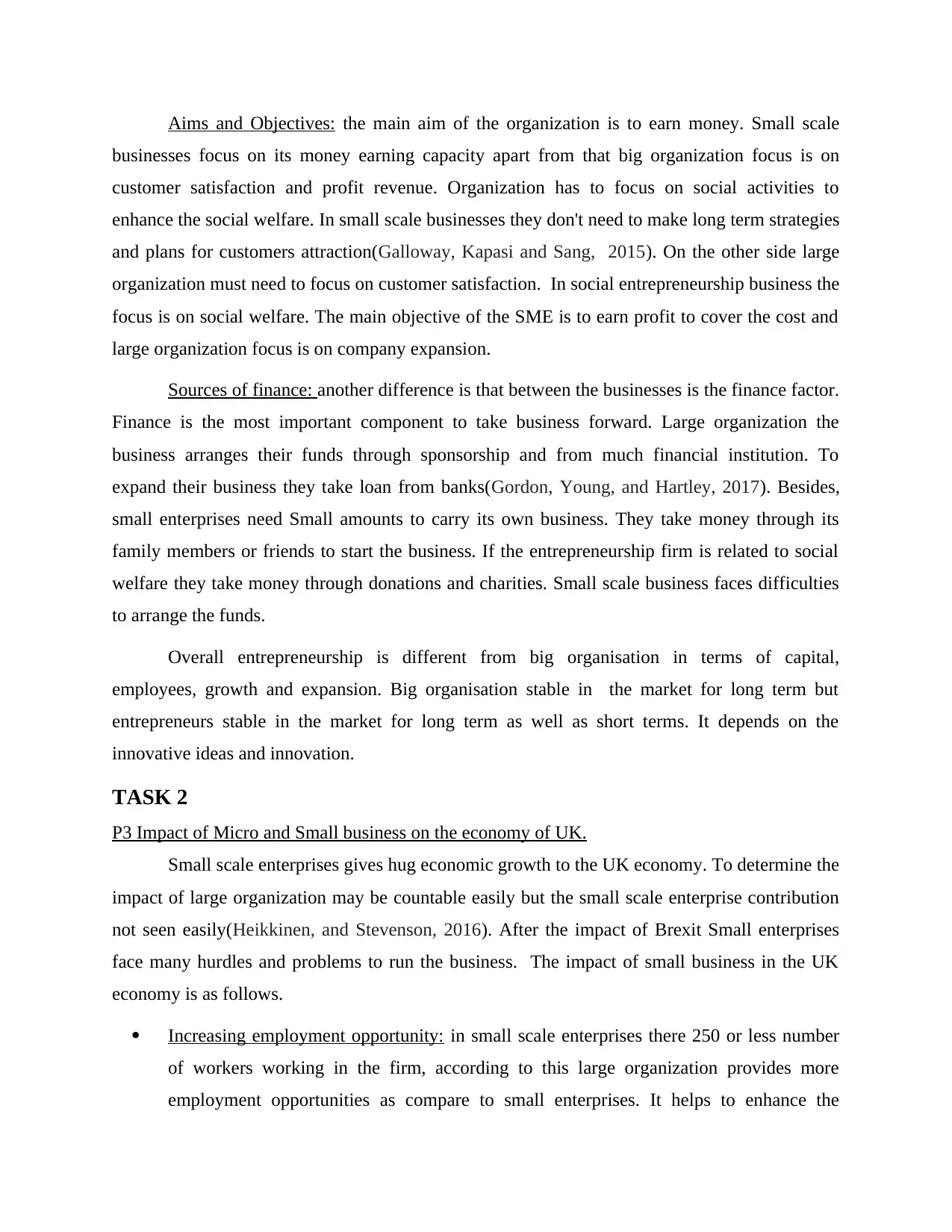
Aims and Objectives: the main aim of the organization is to earn money. Small scale
businesses focus on its money earning capacity apart from that big organization focus is on
customer satisfaction and profit revenue. Organization has to focus on social activities to
enhance the social welfare. In small scale businesses they don't need to make long term strategies
and plans for customers attraction(Galloway, Kapasi and Sang, 2015). On the other side large
organization must need to focus on customer satisfaction. In social entrepreneurship business the
focus is on social welfare. The main objective of the SME is to earn profit to cover the cost and
large organization focus is on company expansion.
Sources of finance: another difference is that between the businesses is the finance factor.
Finance is the most important component to take business forward. Large organization the
business arranges their funds through sponsorship and from much financial institution. To
expand their business they take loan from banks(Gordon, Young, and Hartley, 2017). Besides,
small enterprises need Small amounts to carry its own business. They take money through its
family members or friends to start the business. If the entrepreneurship firm is related to social
welfare they take money through donations and charities. Small scale business faces difficulties
to arrange the funds.
Overall entrepreneurship is different from big organisation in terms of capital,
employees, growth and expansion. Big organisation stable in the market for long term but
entrepreneurs stable in the market for long term as well as short terms. It depends on the
innovative ideas and innovation.
TASK 2
P3 Impact of Micro and Small business on the economy of UK.
Small scale enterprises gives hug economic growth to the UK economy. To determine the
impact of large organization may be countable easily but the small scale enterprise contribution
not seen easily(Heikkinen, and Stevenson, 2016). After the impact of Brexit Small enterprises
face many hurdles and problems to run the business. The impact of small business in the UK
economy is as follows.
Increasing employment opportunity: in small scale enterprises there 250 or less number
of workers working in the firm, according to this large organization provides more
employment opportunities as compare to small enterprises. It helps to enhance the
businesses focus on its money earning capacity apart from that big organization focus is on
customer satisfaction and profit revenue. Organization has to focus on social activities to
enhance the social welfare. In small scale businesses they don't need to make long term strategies
and plans for customers attraction(Galloway, Kapasi and Sang, 2015). On the other side large
organization must need to focus on customer satisfaction. In social entrepreneurship business the
focus is on social welfare. The main objective of the SME is to earn profit to cover the cost and
large organization focus is on company expansion.
Sources of finance: another difference is that between the businesses is the finance factor.
Finance is the most important component to take business forward. Large organization the
business arranges their funds through sponsorship and from much financial institution. To
expand their business they take loan from banks(Gordon, Young, and Hartley, 2017). Besides,
small enterprises need Small amounts to carry its own business. They take money through its
family members or friends to start the business. If the entrepreneurship firm is related to social
welfare they take money through donations and charities. Small scale business faces difficulties
to arrange the funds.
Overall entrepreneurship is different from big organisation in terms of capital,
employees, growth and expansion. Big organisation stable in the market for long term but
entrepreneurs stable in the market for long term as well as short terms. It depends on the
innovative ideas and innovation.
TASK 2
P3 Impact of Micro and Small business on the economy of UK.
Small scale enterprises gives hug economic growth to the UK economy. To determine the
impact of large organization may be countable easily but the small scale enterprise contribution
not seen easily(Heikkinen, and Stevenson, 2016). After the impact of Brexit Small enterprises
face many hurdles and problems to run the business. The impact of small business in the UK
economy is as follows.
Increasing employment opportunity: in small scale enterprises there 250 or less number
of workers working in the firm, according to this large organization provides more
employment opportunities as compare to small enterprises. It helps to enhance the
⊘ This is a preview!⊘
Do you want full access?
Subscribe today to unlock all pages.

Trusted by 1+ million students worldwide
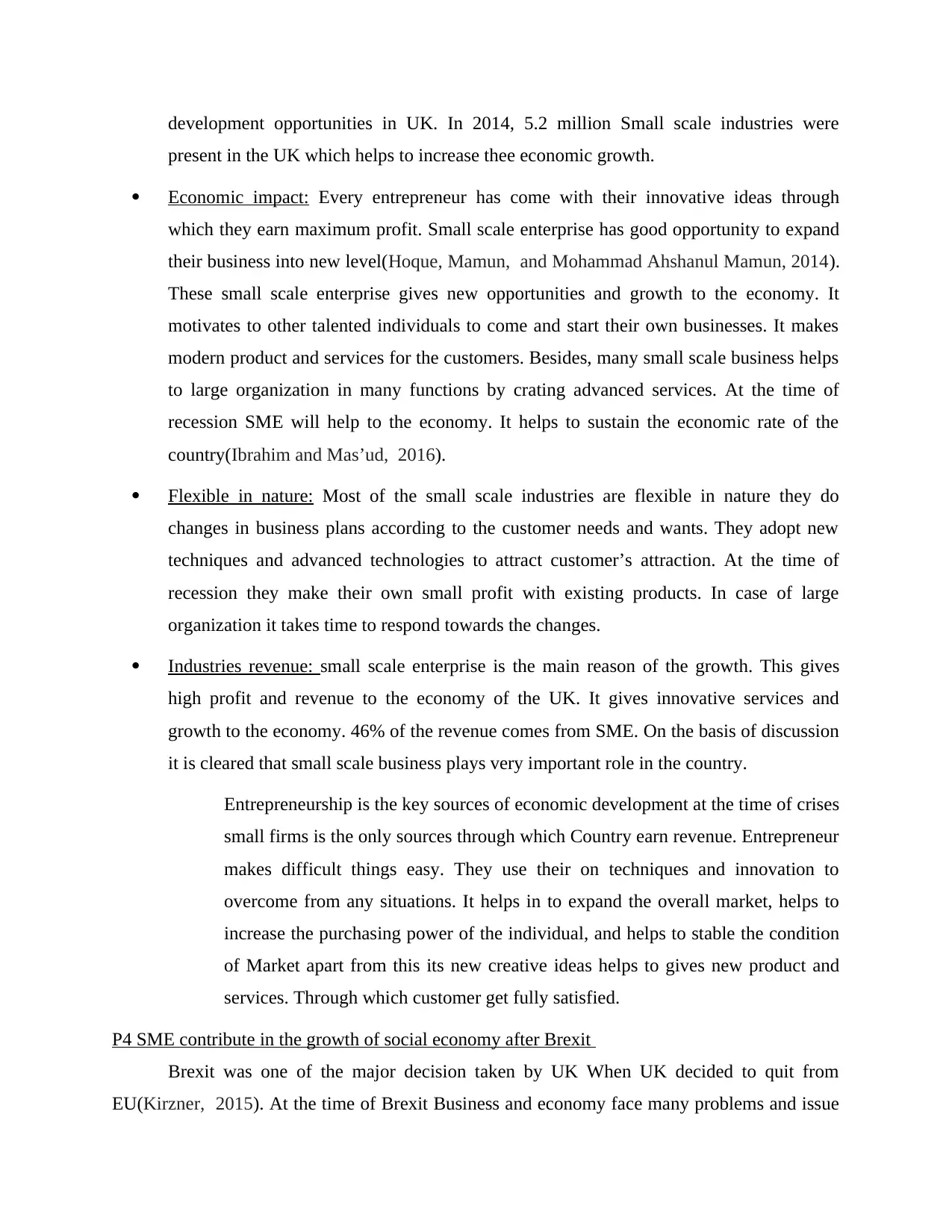
development opportunities in UK. In 2014, 5.2 million Small scale industries were
present in the UK which helps to increase thee economic growth.
Economic impact: Every entrepreneur has come with their innovative ideas through
which they earn maximum profit. Small scale enterprise has good opportunity to expand
their business into new level(Hoque, Mamun, and Mohammad Ahshanul Mamun, 2014).
These small scale enterprise gives new opportunities and growth to the economy. It
motivates to other talented individuals to come and start their own businesses. It makes
modern product and services for the customers. Besides, many small scale business helps
to large organization in many functions by crating advanced services. At the time of
recession SME will help to the economy. It helps to sustain the economic rate of the
country(Ibrahim and Mas’ud, 2016).
Flexible in nature: Most of the small scale industries are flexible in nature they do
changes in business plans according to the customer needs and wants. They adopt new
techniques and advanced technologies to attract customer’s attraction. At the time of
recession they make their own small profit with existing products. In case of large
organization it takes time to respond towards the changes.
Industries revenue: small scale enterprise is the main reason of the growth. This gives
high profit and revenue to the economy of the UK. It gives innovative services and
growth to the economy. 46% of the revenue comes from SME. On the basis of discussion
it is cleared that small scale business plays very important role in the country.
Entrepreneurship is the key sources of economic development at the time of crises
small firms is the only sources through which Country earn revenue. Entrepreneur
makes difficult things easy. They use their on techniques and innovation to
overcome from any situations. It helps in to expand the overall market, helps to
increase the purchasing power of the individual, and helps to stable the condition
of Market apart from this its new creative ideas helps to gives new product and
services. Through which customer get fully satisfied.
P4 SME contribute in the growth of social economy after Brexit
Brexit was one of the major decision taken by UK When UK decided to quit from
EU(Kirzner, 2015). At the time of Brexit Business and economy face many problems and issue
present in the UK which helps to increase thee economic growth.
Economic impact: Every entrepreneur has come with their innovative ideas through
which they earn maximum profit. Small scale enterprise has good opportunity to expand
their business into new level(Hoque, Mamun, and Mohammad Ahshanul Mamun, 2014).
These small scale enterprise gives new opportunities and growth to the economy. It
motivates to other talented individuals to come and start their own businesses. It makes
modern product and services for the customers. Besides, many small scale business helps
to large organization in many functions by crating advanced services. At the time of
recession SME will help to the economy. It helps to sustain the economic rate of the
country(Ibrahim and Mas’ud, 2016).
Flexible in nature: Most of the small scale industries are flexible in nature they do
changes in business plans according to the customer needs and wants. They adopt new
techniques and advanced technologies to attract customer’s attraction. At the time of
recession they make their own small profit with existing products. In case of large
organization it takes time to respond towards the changes.
Industries revenue: small scale enterprise is the main reason of the growth. This gives
high profit and revenue to the economy of the UK. It gives innovative services and
growth to the economy. 46% of the revenue comes from SME. On the basis of discussion
it is cleared that small scale business plays very important role in the country.
Entrepreneurship is the key sources of economic development at the time of crises
small firms is the only sources through which Country earn revenue. Entrepreneur
makes difficult things easy. They use their on techniques and innovation to
overcome from any situations. It helps in to expand the overall market, helps to
increase the purchasing power of the individual, and helps to stable the condition
of Market apart from this its new creative ideas helps to gives new product and
services. Through which customer get fully satisfied.
P4 SME contribute in the growth of social economy after Brexit
Brexit was one of the major decision taken by UK When UK decided to quit from
EU(Kirzner, 2015). At the time of Brexit Business and economy face many problems and issue
Paraphrase This Document
Need a fresh take? Get an instant paraphrase of this document with our AI Paraphraser
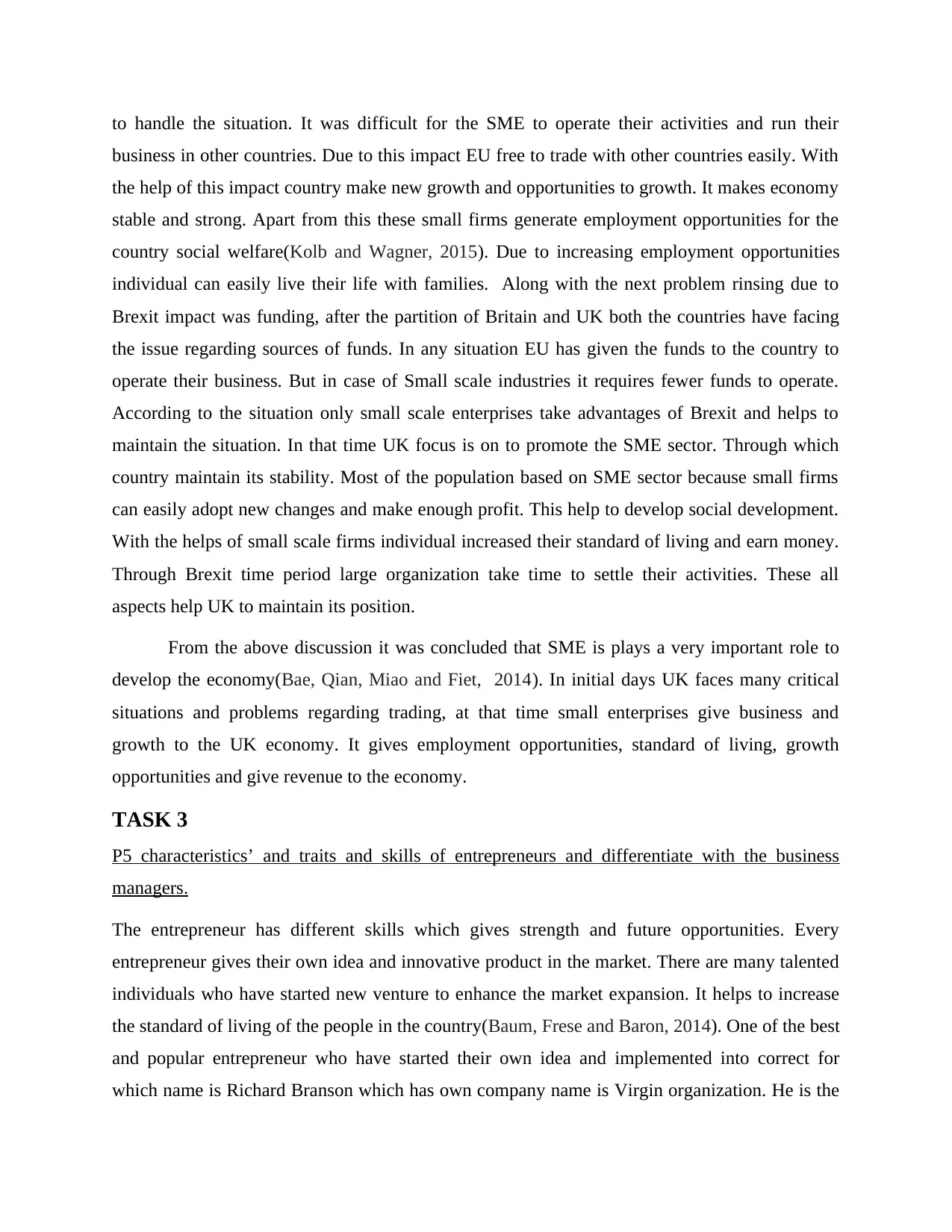
to handle the situation. It was difficult for the SME to operate their activities and run their
business in other countries. Due to this impact EU free to trade with other countries easily. With
the help of this impact country make new growth and opportunities to growth. It makes economy
stable and strong. Apart from this these small firms generate employment opportunities for the
country social welfare(Kolb and Wagner, 2015). Due to increasing employment opportunities
individual can easily live their life with families. Along with the next problem rinsing due to
Brexit impact was funding, after the partition of Britain and UK both the countries have facing
the issue regarding sources of funds. In any situation EU has given the funds to the country to
operate their business. But in case of Small scale industries it requires fewer funds to operate.
According to the situation only small scale enterprises take advantages of Brexit and helps to
maintain the situation. In that time UK focus is on to promote the SME sector. Through which
country maintain its stability. Most of the population based on SME sector because small firms
can easily adopt new changes and make enough profit. This help to develop social development.
With the helps of small scale firms individual increased their standard of living and earn money.
Through Brexit time period large organization take time to settle their activities. These all
aspects help UK to maintain its position.
From the above discussion it was concluded that SME is plays a very important role to
develop the economy(Bae, Qian, Miao and Fiet, 2014). In initial days UK faces many critical
situations and problems regarding trading, at that time small enterprises give business and
growth to the UK economy. It gives employment opportunities, standard of living, growth
opportunities and give revenue to the economy.
TASK 3
P5 characteristics’ and traits and skills of entrepreneurs and differentiate with the business
managers.
The entrepreneur has different skills which gives strength and future opportunities. Every
entrepreneur gives their own idea and innovative product in the market. There are many talented
individuals who have started new venture to enhance the market expansion. It helps to increase
the standard of living of the people in the country(Baum, Frese and Baron, 2014). One of the best
and popular entrepreneur who have started their own idea and implemented into correct for
which name is Richard Branson which has own company name is Virgin organization. He is the
business in other countries. Due to this impact EU free to trade with other countries easily. With
the help of this impact country make new growth and opportunities to growth. It makes economy
stable and strong. Apart from this these small firms generate employment opportunities for the
country social welfare(Kolb and Wagner, 2015). Due to increasing employment opportunities
individual can easily live their life with families. Along with the next problem rinsing due to
Brexit impact was funding, after the partition of Britain and UK both the countries have facing
the issue regarding sources of funds. In any situation EU has given the funds to the country to
operate their business. But in case of Small scale industries it requires fewer funds to operate.
According to the situation only small scale enterprises take advantages of Brexit and helps to
maintain the situation. In that time UK focus is on to promote the SME sector. Through which
country maintain its stability. Most of the population based on SME sector because small firms
can easily adopt new changes and make enough profit. This help to develop social development.
With the helps of small scale firms individual increased their standard of living and earn money.
Through Brexit time period large organization take time to settle their activities. These all
aspects help UK to maintain its position.
From the above discussion it was concluded that SME is plays a very important role to
develop the economy(Bae, Qian, Miao and Fiet, 2014). In initial days UK faces many critical
situations and problems regarding trading, at that time small enterprises give business and
growth to the UK economy. It gives employment opportunities, standard of living, growth
opportunities and give revenue to the economy.
TASK 3
P5 characteristics’ and traits and skills of entrepreneurs and differentiate with the business
managers.
The entrepreneur has different skills which gives strength and future opportunities. Every
entrepreneur gives their own idea and innovative product in the market. There are many talented
individuals who have started new venture to enhance the market expansion. It helps to increase
the standard of living of the people in the country(Baum, Frese and Baron, 2014). One of the best
and popular entrepreneur who have started their own idea and implemented into correct for
which name is Richard Branson which has own company name is Virgin organization. He is the
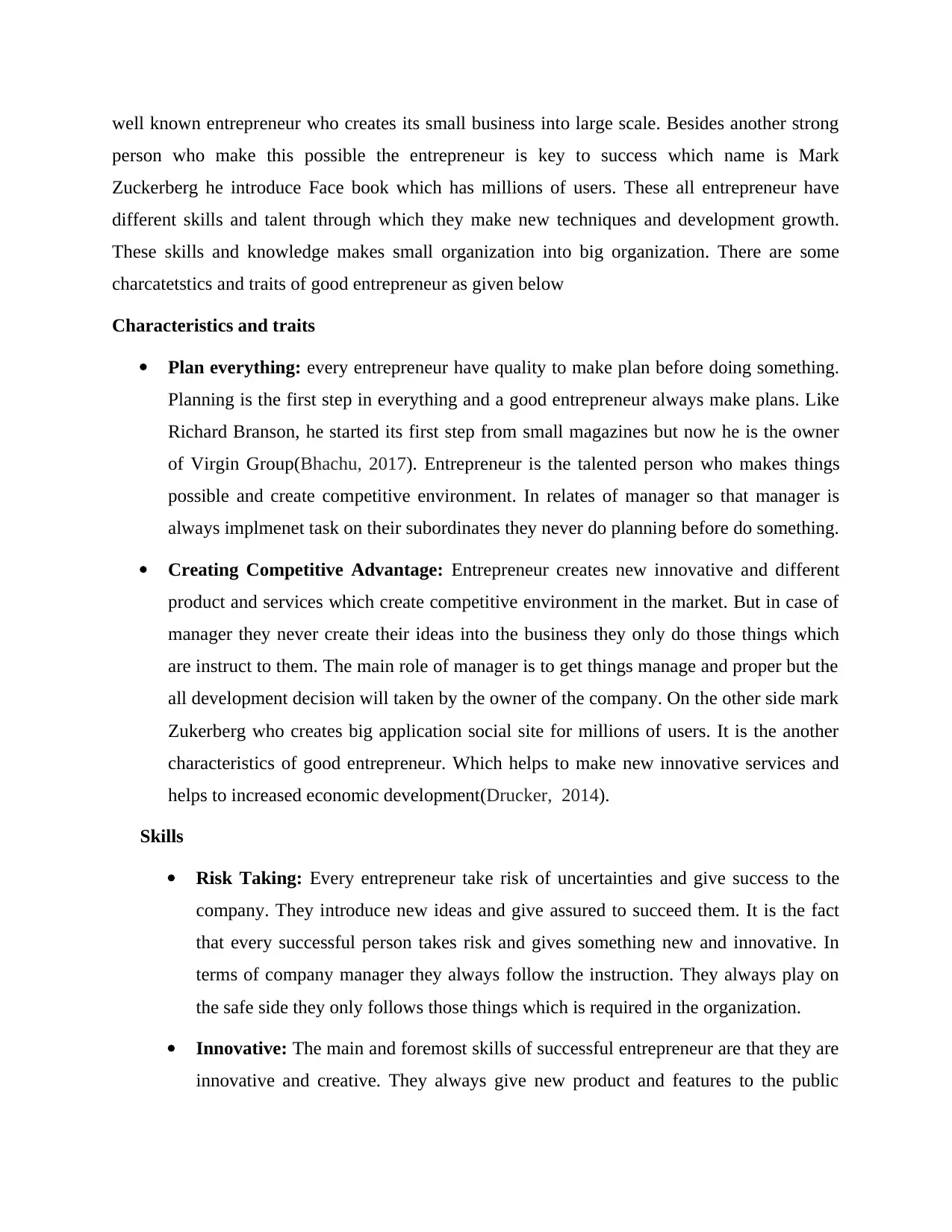
well known entrepreneur who creates its small business into large scale. Besides another strong
person who make this possible the entrepreneur is key to success which name is Mark
Zuckerberg he introduce Face book which has millions of users. These all entrepreneur have
different skills and talent through which they make new techniques and development growth.
These skills and knowledge makes small organization into big organization. There are some
charcatetstics and traits of good entrepreneur as given below
Characteristics and traits
Plan everything: every entrepreneur have quality to make plan before doing something.
Planning is the first step in everything and a good entrepreneur always make plans. Like
Richard Branson, he started its first step from small magazines but now he is the owner
of Virgin Group(Bhachu, 2017). Entrepreneur is the talented person who makes things
possible and create competitive environment. In relates of manager so that manager is
always implmenet task on their subordinates they never do planning before do something.
Creating Competitive Advantage: Entrepreneur creates new innovative and different
product and services which create competitive environment in the market. But in case of
manager they never create their ideas into the business they only do those things which
are instruct to them. The main role of manager is to get things manage and proper but the
all development decision will taken by the owner of the company. On the other side mark
Zukerberg who creates big application social site for millions of users. It is the another
characteristics of good entrepreneur. Which helps to make new innovative services and
helps to increased economic development(Drucker, 2014).
Skills
Risk Taking: Every entrepreneur take risk of uncertainties and give success to the
company. They introduce new ideas and give assured to succeed them. It is the fact
that every successful person takes risk and gives something new and innovative. In
terms of company manager they always follow the instruction. They always play on
the safe side they only follows those things which is required in the organization.
Innovative: The main and foremost skills of successful entrepreneur are that they are
innovative and creative. They always give new product and features to the public
person who make this possible the entrepreneur is key to success which name is Mark
Zuckerberg he introduce Face book which has millions of users. These all entrepreneur have
different skills and talent through which they make new techniques and development growth.
These skills and knowledge makes small organization into big organization. There are some
charcatetstics and traits of good entrepreneur as given below
Characteristics and traits
Plan everything: every entrepreneur have quality to make plan before doing something.
Planning is the first step in everything and a good entrepreneur always make plans. Like
Richard Branson, he started its first step from small magazines but now he is the owner
of Virgin Group(Bhachu, 2017). Entrepreneur is the talented person who makes things
possible and create competitive environment. In relates of manager so that manager is
always implmenet task on their subordinates they never do planning before do something.
Creating Competitive Advantage: Entrepreneur creates new innovative and different
product and services which create competitive environment in the market. But in case of
manager they never create their ideas into the business they only do those things which
are instruct to them. The main role of manager is to get things manage and proper but the
all development decision will taken by the owner of the company. On the other side mark
Zukerberg who creates big application social site for millions of users. It is the another
characteristics of good entrepreneur. Which helps to make new innovative services and
helps to increased economic development(Drucker, 2014).
Skills
Risk Taking: Every entrepreneur take risk of uncertainties and give success to the
company. They introduce new ideas and give assured to succeed them. It is the fact
that every successful person takes risk and gives something new and innovative. In
terms of company manager they always follow the instruction. They always play on
the safe side they only follows those things which is required in the organization.
Innovative: The main and foremost skills of successful entrepreneur are that they are
innovative and creative. They always give new product and features to the public
⊘ This is a preview!⊘
Do you want full access?
Subscribe today to unlock all pages.

Trusted by 1+ million students worldwide
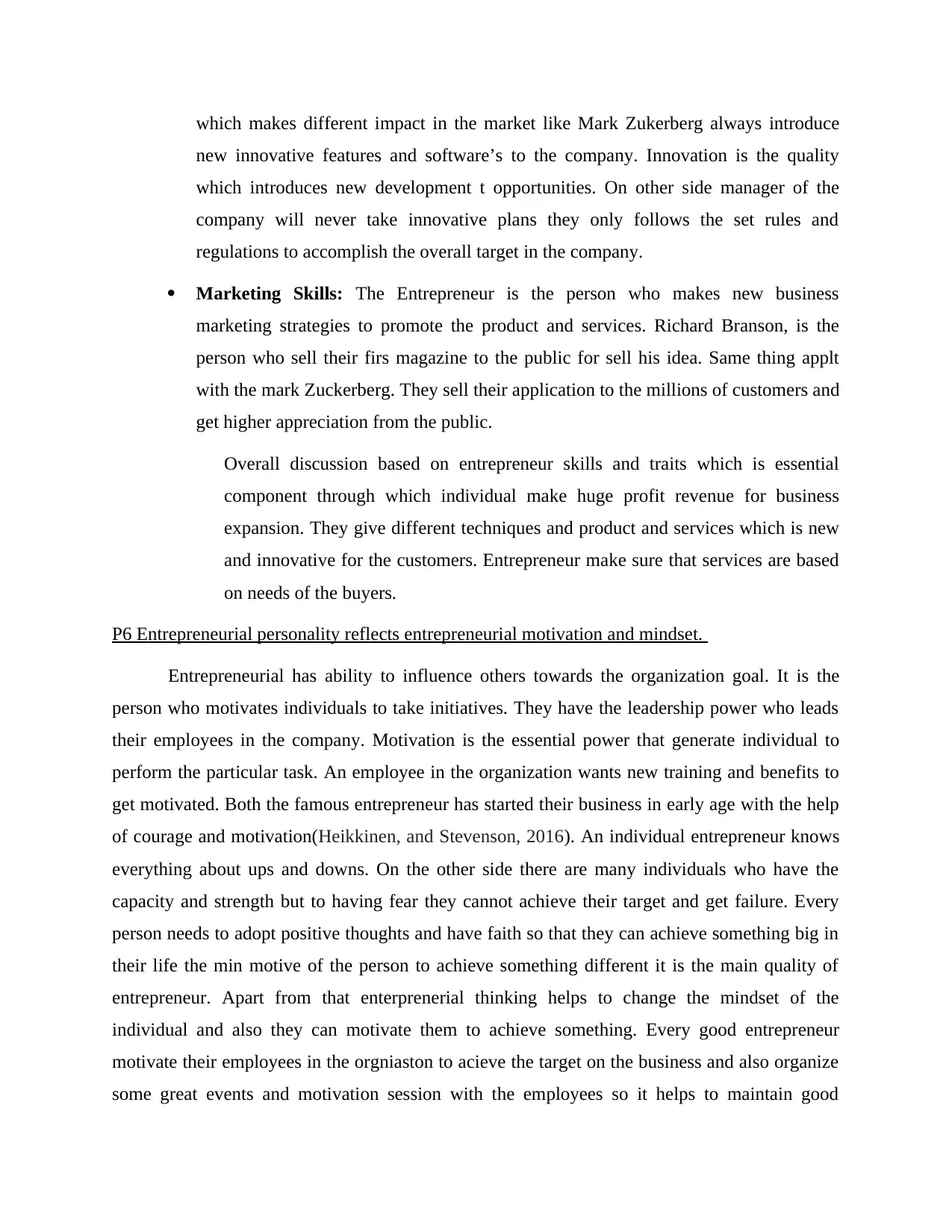
which makes different impact in the market like Mark Zukerberg always introduce
new innovative features and software’s to the company. Innovation is the quality
which introduces new development t opportunities. On other side manager of the
company will never take innovative plans they only follows the set rules and
regulations to accomplish the overall target in the company.
Marketing Skills: The Entrepreneur is the person who makes new business
marketing strategies to promote the product and services. Richard Branson, is the
person who sell their firs magazine to the public for sell his idea. Same thing applt
with the mark Zuckerberg. They sell their application to the millions of customers and
get higher appreciation from the public.
Overall discussion based on entrepreneur skills and traits which is essential
component through which individual make huge profit revenue for business
expansion. They give different techniques and product and services which is new
and innovative for the customers. Entrepreneur make sure that services are based
on needs of the buyers.
P6 Entrepreneurial personality reflects entrepreneurial motivation and mindset.
Entrepreneurial has ability to influence others towards the organization goal. It is the
person who motivates individuals to take initiatives. They have the leadership power who leads
their employees in the company. Motivation is the essential power that generate individual to
perform the particular task. An employee in the organization wants new training and benefits to
get motivated. Both the famous entrepreneur has started their business in early age with the help
of courage and motivation(Heikkinen, and Stevenson, 2016). An individual entrepreneur knows
everything about ups and downs. On the other side there are many individuals who have the
capacity and strength but to having fear they cannot achieve their target and get failure. Every
person needs to adopt positive thoughts and have faith so that they can achieve something big in
their life the min motive of the person to achieve something different it is the main quality of
entrepreneur. Apart from that enterprenerial thinking helps to change the mindset of the
individual and also they can motivate them to achieve something. Every good entrepreneur
motivate their employees in the orgniaston to acieve the target on the business and also organize
some great events and motivation session with the employees so it helps to maintain good
new innovative features and software’s to the company. Innovation is the quality
which introduces new development t opportunities. On other side manager of the
company will never take innovative plans they only follows the set rules and
regulations to accomplish the overall target in the company.
Marketing Skills: The Entrepreneur is the person who makes new business
marketing strategies to promote the product and services. Richard Branson, is the
person who sell their firs magazine to the public for sell his idea. Same thing applt
with the mark Zuckerberg. They sell their application to the millions of customers and
get higher appreciation from the public.
Overall discussion based on entrepreneur skills and traits which is essential
component through which individual make huge profit revenue for business
expansion. They give different techniques and product and services which is new
and innovative for the customers. Entrepreneur make sure that services are based
on needs of the buyers.
P6 Entrepreneurial personality reflects entrepreneurial motivation and mindset.
Entrepreneurial has ability to influence others towards the organization goal. It is the
person who motivates individuals to take initiatives. They have the leadership power who leads
their employees in the company. Motivation is the essential power that generate individual to
perform the particular task. An employee in the organization wants new training and benefits to
get motivated. Both the famous entrepreneur has started their business in early age with the help
of courage and motivation(Heikkinen, and Stevenson, 2016). An individual entrepreneur knows
everything about ups and downs. On the other side there are many individuals who have the
capacity and strength but to having fear they cannot achieve their target and get failure. Every
person needs to adopt positive thoughts and have faith so that they can achieve something big in
their life the min motive of the person to achieve something different it is the main quality of
entrepreneur. Apart from that enterprenerial thinking helps to change the mindset of the
individual and also they can motivate them to achieve something. Every good entrepreneur
motivate their employees in the orgniaston to acieve the target on the business and also organize
some great events and motivation session with the employees so it helps to maintain good
Paraphrase This Document
Need a fresh take? Get an instant paraphrase of this document with our AI Paraphraser
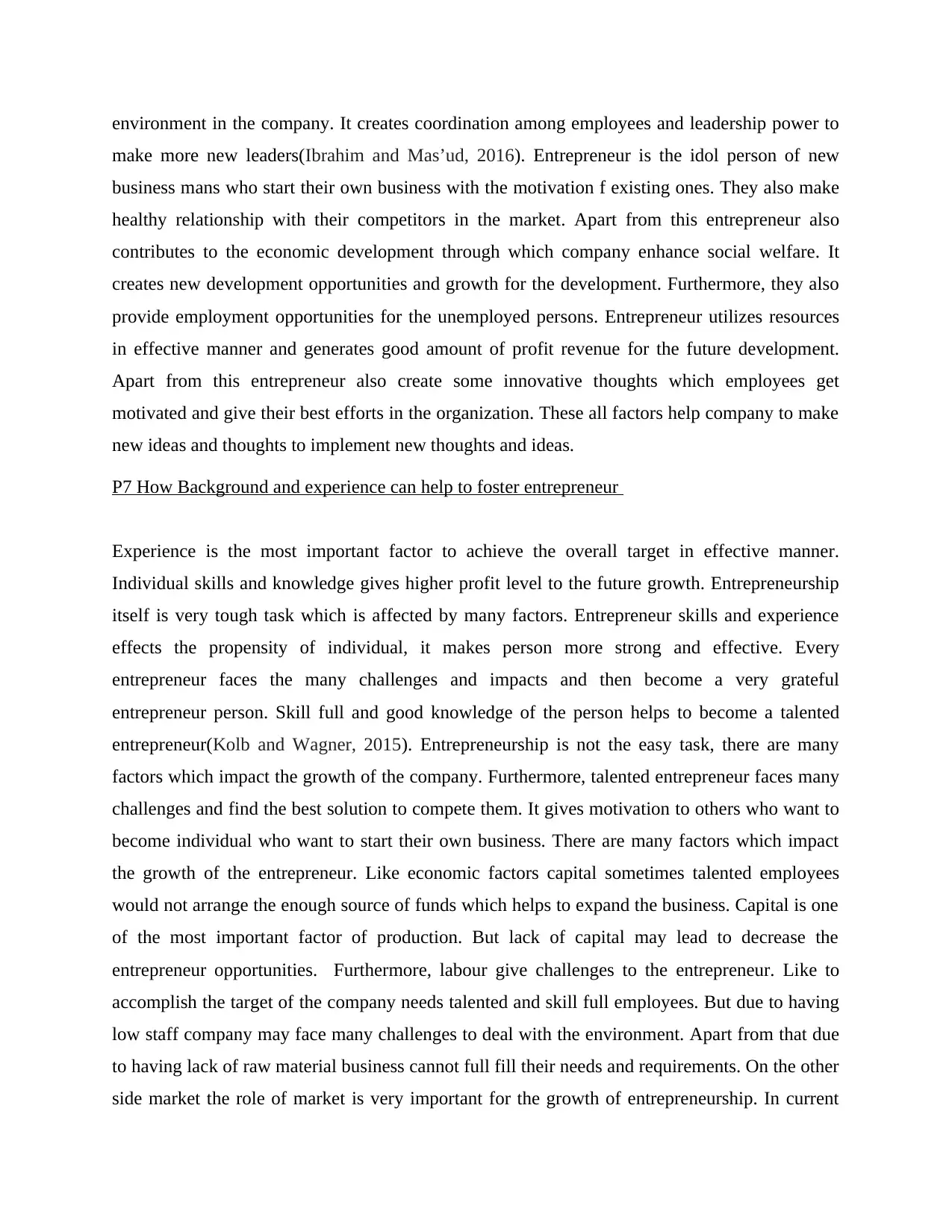
environment in the company. It creates coordination among employees and leadership power to
make more new leaders(Ibrahim and Mas’ud, 2016). Entrepreneur is the idol person of new
business mans who start their own business with the motivation f existing ones. They also make
healthy relationship with their competitors in the market. Apart from this entrepreneur also
contributes to the economic development through which company enhance social welfare. It
creates new development opportunities and growth for the development. Furthermore, they also
provide employment opportunities for the unemployed persons. Entrepreneur utilizes resources
in effective manner and generates good amount of profit revenue for the future development.
Apart from this entrepreneur also create some innovative thoughts which employees get
motivated and give their best efforts in the organization. These all factors help company to make
new ideas and thoughts to implement new thoughts and ideas.
P7 How Background and experience can help to foster entrepreneur
Experience is the most important factor to achieve the overall target in effective manner.
Individual skills and knowledge gives higher profit level to the future growth. Entrepreneurship
itself is very tough task which is affected by many factors. Entrepreneur skills and experience
effects the propensity of individual, it makes person more strong and effective. Every
entrepreneur faces the many challenges and impacts and then become a very grateful
entrepreneur person. Skill full and good knowledge of the person helps to become a talented
entrepreneur(Kolb and Wagner, 2015). Entrepreneurship is not the easy task, there are many
factors which impact the growth of the company. Furthermore, talented entrepreneur faces many
challenges and find the best solution to compete them. It gives motivation to others who want to
become individual who want to start their own business. There are many factors which impact
the growth of the entrepreneur. Like economic factors capital sometimes talented employees
would not arrange the enough source of funds which helps to expand the business. Capital is one
of the most important factor of production. But lack of capital may lead to decrease the
entrepreneur opportunities. Furthermore, labour give challenges to the entrepreneur. Like to
accomplish the target of the company needs talented and skill full employees. But due to having
low staff company may face many challenges to deal with the environment. Apart from that due
to having lack of raw material business cannot full fill their needs and requirements. On the other
side market the role of market is very important for the growth of entrepreneurship. In current
make more new leaders(Ibrahim and Mas’ud, 2016). Entrepreneur is the idol person of new
business mans who start their own business with the motivation f existing ones. They also make
healthy relationship with their competitors in the market. Apart from this entrepreneur also
contributes to the economic development through which company enhance social welfare. It
creates new development opportunities and growth for the development. Furthermore, they also
provide employment opportunities for the unemployed persons. Entrepreneur utilizes resources
in effective manner and generates good amount of profit revenue for the future development.
Apart from this entrepreneur also create some innovative thoughts which employees get
motivated and give their best efforts in the organization. These all factors help company to make
new ideas and thoughts to implement new thoughts and ideas.
P7 How Background and experience can help to foster entrepreneur
Experience is the most important factor to achieve the overall target in effective manner.
Individual skills and knowledge gives higher profit level to the future growth. Entrepreneurship
itself is very tough task which is affected by many factors. Entrepreneur skills and experience
effects the propensity of individual, it makes person more strong and effective. Every
entrepreneur faces the many challenges and impacts and then become a very grateful
entrepreneur person. Skill full and good knowledge of the person helps to become a talented
entrepreneur(Kolb and Wagner, 2015). Entrepreneurship is not the easy task, there are many
factors which impact the growth of the company. Furthermore, talented entrepreneur faces many
challenges and find the best solution to compete them. It gives motivation to others who want to
become individual who want to start their own business. There are many factors which impact
the growth of the entrepreneur. Like economic factors capital sometimes talented employees
would not arrange the enough source of funds which helps to expand the business. Capital is one
of the most important factor of production. But lack of capital may lead to decrease the
entrepreneur opportunities. Furthermore, labour give challenges to the entrepreneur. Like to
accomplish the target of the company needs talented and skill full employees. But due to having
low staff company may face many challenges to deal with the environment. Apart from that due
to having lack of raw material business cannot full fill their needs and requirements. On the other
side market the role of market is very important for the growth of entrepreneurship. In current
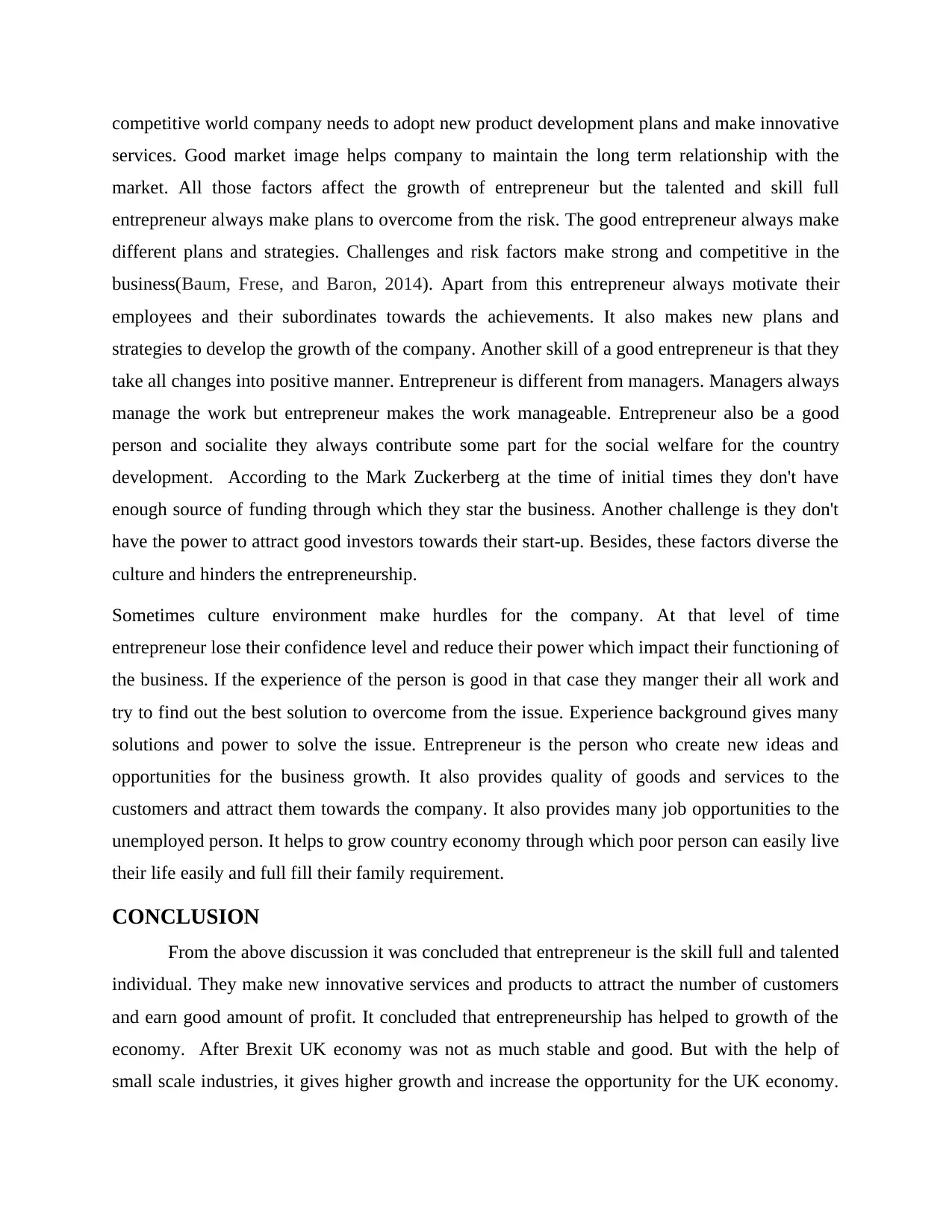
competitive world company needs to adopt new product development plans and make innovative
services. Good market image helps company to maintain the long term relationship with the
market. All those factors affect the growth of entrepreneur but the talented and skill full
entrepreneur always make plans to overcome from the risk. The good entrepreneur always make
different plans and strategies. Challenges and risk factors make strong and competitive in the
business(Baum, Frese, and Baron, 2014). Apart from this entrepreneur always motivate their
employees and their subordinates towards the achievements. It also makes new plans and
strategies to develop the growth of the company. Another skill of a good entrepreneur is that they
take all changes into positive manner. Entrepreneur is different from managers. Managers always
manage the work but entrepreneur makes the work manageable. Entrepreneur also be a good
person and socialite they always contribute some part for the social welfare for the country
development. According to the Mark Zuckerberg at the time of initial times they don't have
enough source of funding through which they star the business. Another challenge is they don't
have the power to attract good investors towards their start-up. Besides, these factors diverse the
culture and hinders the entrepreneurship.
Sometimes culture environment make hurdles for the company. At that level of time
entrepreneur lose their confidence level and reduce their power which impact their functioning of
the business. If the experience of the person is good in that case they manger their all work and
try to find out the best solution to overcome from the issue. Experience background gives many
solutions and power to solve the issue. Entrepreneur is the person who create new ideas and
opportunities for the business growth. It also provides quality of goods and services to the
customers and attract them towards the company. It also provides many job opportunities to the
unemployed person. It helps to grow country economy through which poor person can easily live
their life easily and full fill their family requirement.
CONCLUSION
From the above discussion it was concluded that entrepreneur is the skill full and talented
individual. They make new innovative services and products to attract the number of customers
and earn good amount of profit. It concluded that entrepreneurship has helped to growth of the
economy. After Brexit UK economy was not as much stable and good. But with the help of
small scale industries, it gives higher growth and increase the opportunity for the UK economy.
services. Good market image helps company to maintain the long term relationship with the
market. All those factors affect the growth of entrepreneur but the talented and skill full
entrepreneur always make plans to overcome from the risk. The good entrepreneur always make
different plans and strategies. Challenges and risk factors make strong and competitive in the
business(Baum, Frese, and Baron, 2014). Apart from this entrepreneur always motivate their
employees and their subordinates towards the achievements. It also makes new plans and
strategies to develop the growth of the company. Another skill of a good entrepreneur is that they
take all changes into positive manner. Entrepreneur is different from managers. Managers always
manage the work but entrepreneur makes the work manageable. Entrepreneur also be a good
person and socialite they always contribute some part for the social welfare for the country
development. According to the Mark Zuckerberg at the time of initial times they don't have
enough source of funding through which they star the business. Another challenge is they don't
have the power to attract good investors towards their start-up. Besides, these factors diverse the
culture and hinders the entrepreneurship.
Sometimes culture environment make hurdles for the company. At that level of time
entrepreneur lose their confidence level and reduce their power which impact their functioning of
the business. If the experience of the person is good in that case they manger their all work and
try to find out the best solution to overcome from the issue. Experience background gives many
solutions and power to solve the issue. Entrepreneur is the person who create new ideas and
opportunities for the business growth. It also provides quality of goods and services to the
customers and attract them towards the company. It also provides many job opportunities to the
unemployed person. It helps to grow country economy through which poor person can easily live
their life easily and full fill their family requirement.
CONCLUSION
From the above discussion it was concluded that entrepreneur is the skill full and talented
individual. They make new innovative services and products to attract the number of customers
and earn good amount of profit. It concluded that entrepreneurship has helped to growth of the
economy. After Brexit UK economy was not as much stable and good. But with the help of
small scale industries, it gives higher growth and increase the opportunity for the UK economy.
⊘ This is a preview!⊘
Do you want full access?
Subscribe today to unlock all pages.

Trusted by 1+ million students worldwide
1 out of 18
Related Documents
Your All-in-One AI-Powered Toolkit for Academic Success.
+13062052269
info@desklib.com
Available 24*7 on WhatsApp / Email
![[object Object]](/_next/static/media/star-bottom.7253800d.svg)
Unlock your academic potential
Copyright © 2020–2026 A2Z Services. All Rights Reserved. Developed and managed by ZUCOL.





